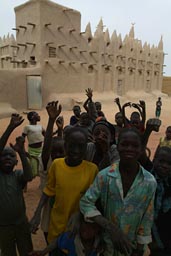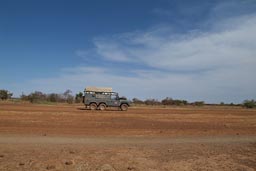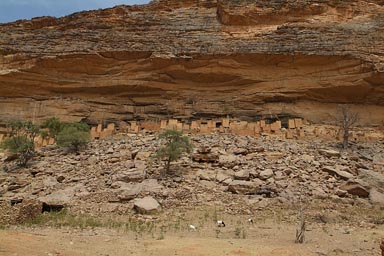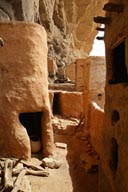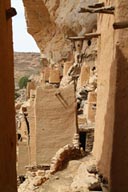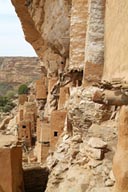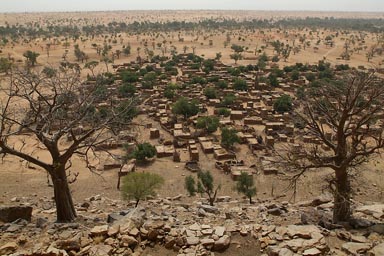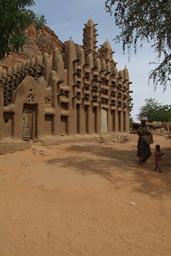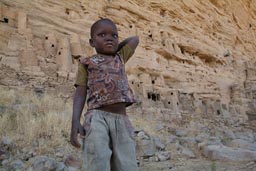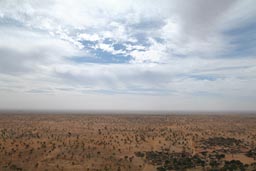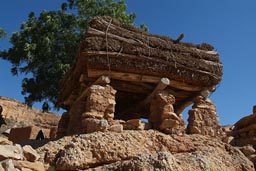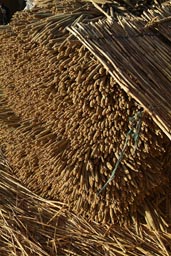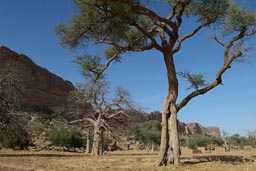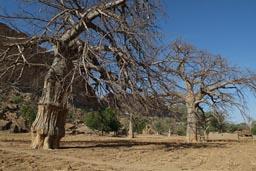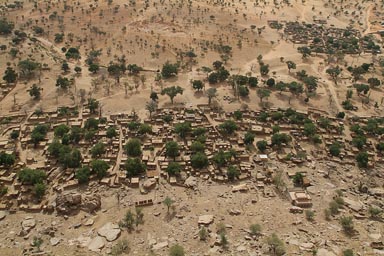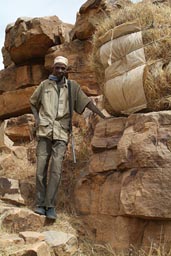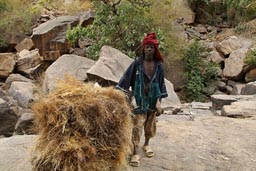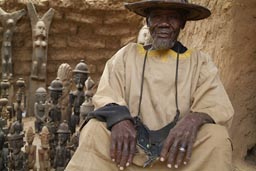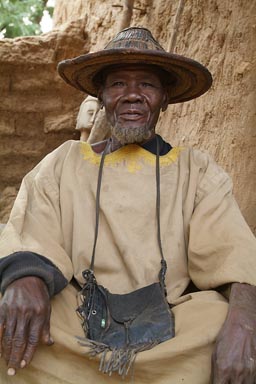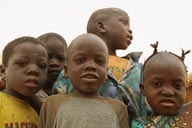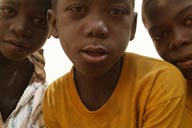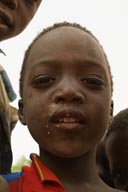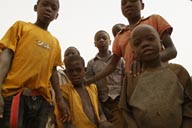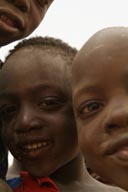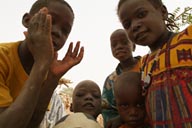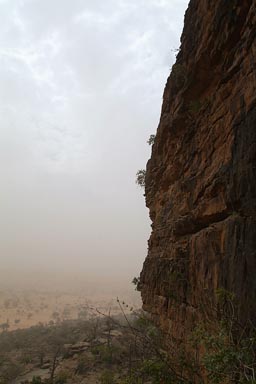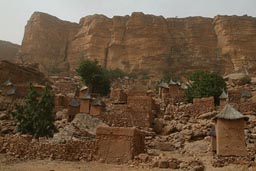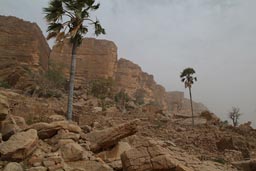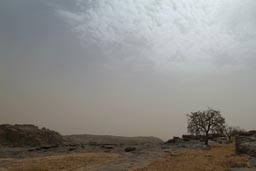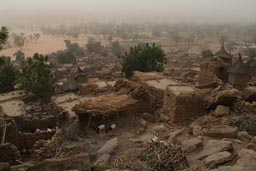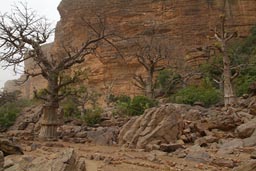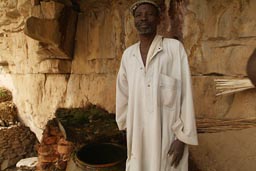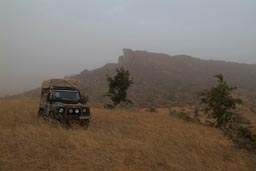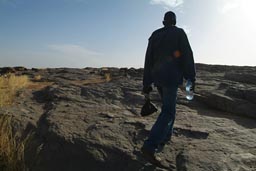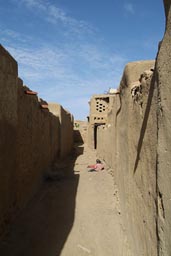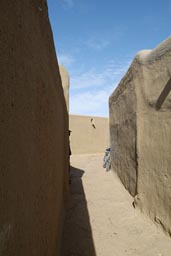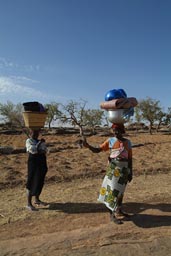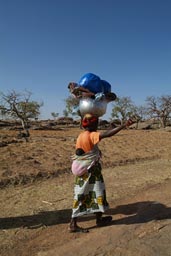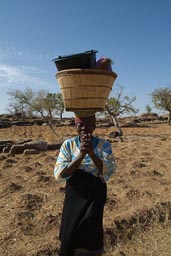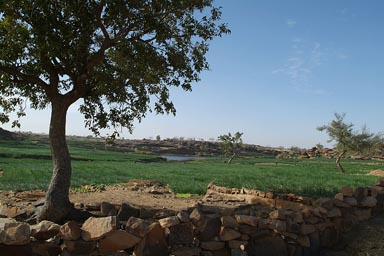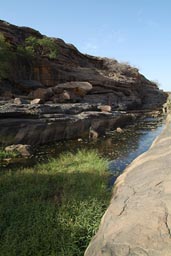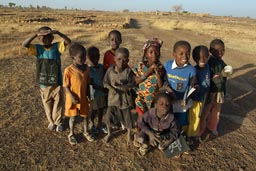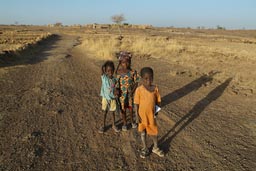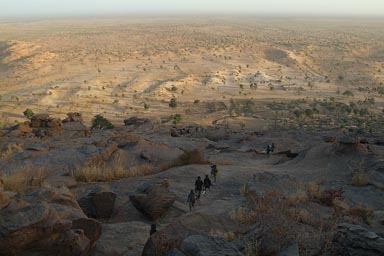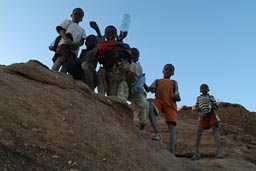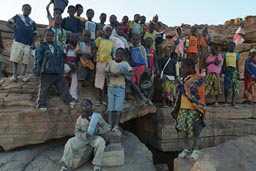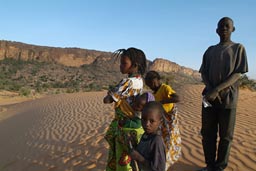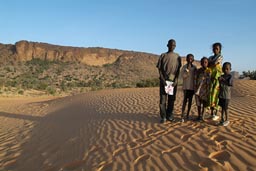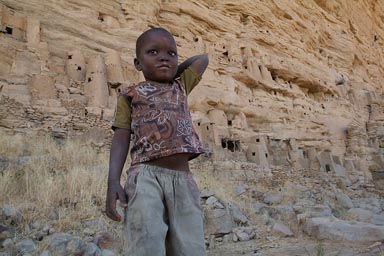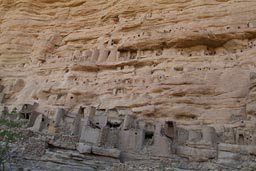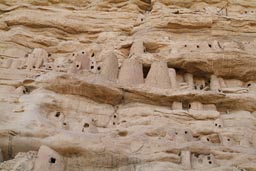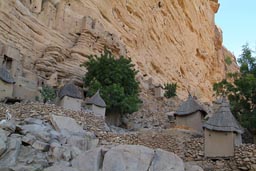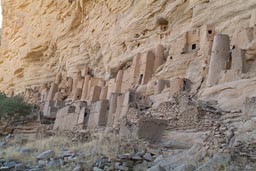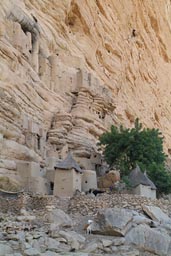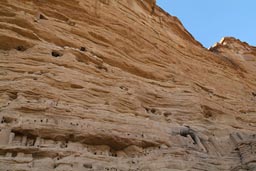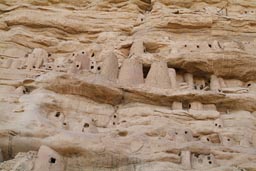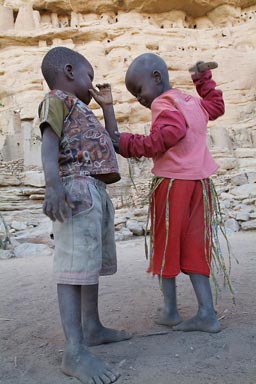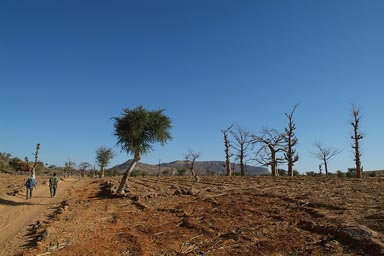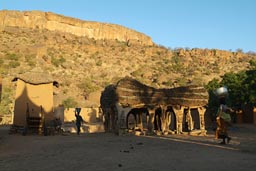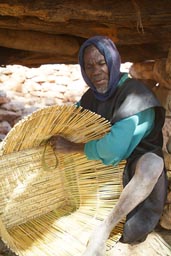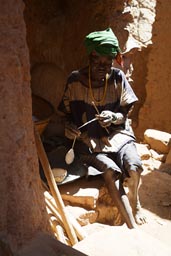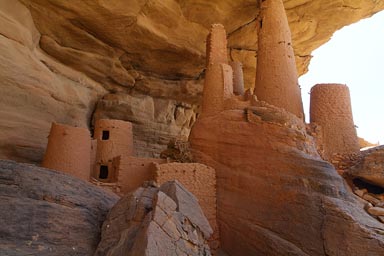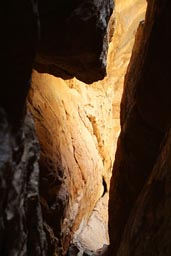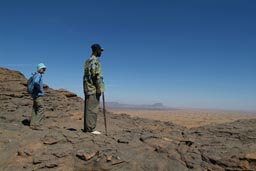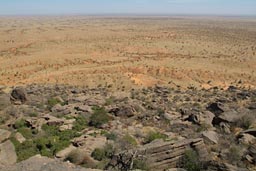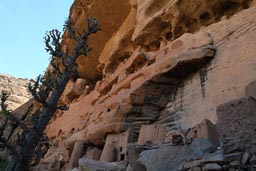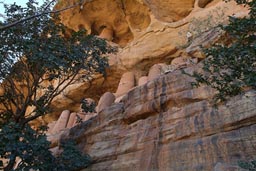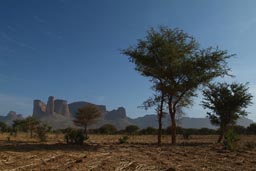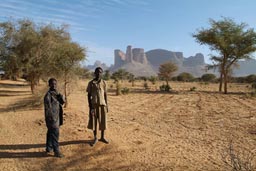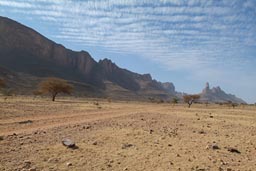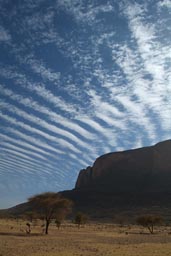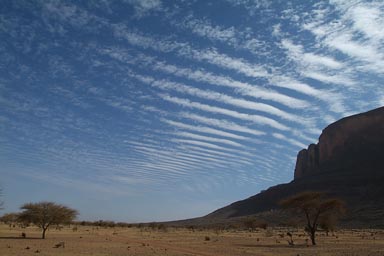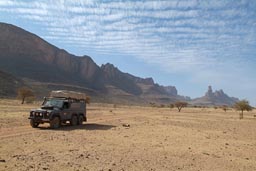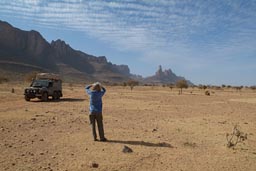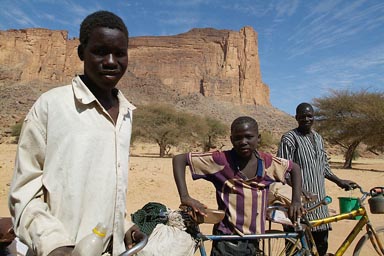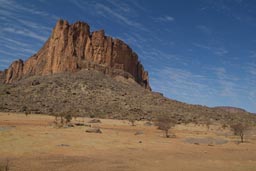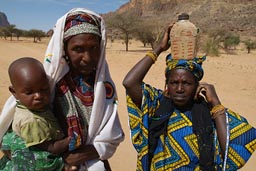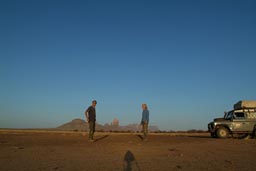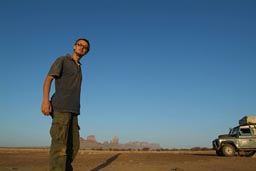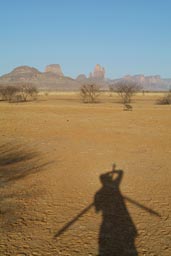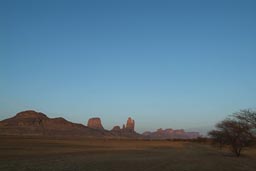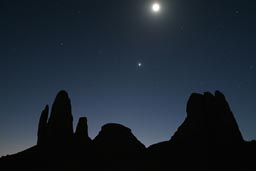www.thisfabtrek.com > journey > africa > mali > 20090131-hombori
Crowning my 8 months stay in Mali.
Download GPS (KML) track/waypoints.
Skies are harmattan heavy, dusty my roads, bone dry conditions, deep fine sand most of the trip north the Niger river, Bamako, Koulikoro, Sirakorola, Nyamina, finally Markala and down to Segou. I wipe the dust of my glasses every 10 minutes or so. In the back of the truck the layers of dust grow into little dunes. An arduous trip, a trek. But the African bush and sahel have me back.
Friday night in Segou. I get to see 3 local bands, the percussion is striking, Abdoulaye still performs with his kora ensemble. Soft is his griot like narrating in Bambara, which always starts with a Oualay Bilay, "Truelly I say to you"... or so. I have taken his picture 3 years ago. He knows that I know him, I slip him 5000, like his soft touch too much. Abdoulaye Tembale and his group Benradi.
18 Jan 2009 - Sevare, near Mopti, Mali.
I have a tire repaired the next morning, drive out of town, not far in the open bush and park. I need to get an idea of the state of my car. Inspecting U-joints, grease them, check oil levels. It's always the prop-shafts and U-joints that give reasons to worry, it seems. I am happy under my Landy. After an hour I am more confident. I should make it to Mopti.
Harmattan is here to stay. I follow the Niger river on its south bank, rice is harvested, in this interior delta. In the name of The River. A bit away from the stream lie the bone dry fields of the sahel. It is so hard to imagine that in only 5 month all will be green and lush again, even flooded. Waterlevels of the holy River will then have risen by som ten metres. Hundreds of kilometres of dust, fields of millet and stuff with herds of cattle on it now, feeding of the stubs, their droppings constituting the natural essential fertilisers.
In Nionkoro I find an elegant mud mosque, to Djénné I only get after dark. I have been here before, need my quick walk around. Most hustlers have long called it a day, the lights go out, I have a beer in complete darkness. I drive on, set over the river and arrive in Sevare near Mopti. Anew I have concerns about tires and U-joints. So repair another tire and inspect my gear before I enter Dogon Country from Somadougou via Bankass to Kani Kombole. First stop Telly.
Enter Dogon Country/Pays Dogon, Mali.
A total of more then 7 months or so now in Mali and finally I get the long envied trip to the Dogon (wiki), a drive along the south side of the 150km Bandiagara Escarpement, some 50km of walk in Africa's most beautiful, nature pure scenery. And the Dogon have culture, history of some 800 years in the area after migrateing from the Mande country east of todays's Bamako towards Guinea, country that looks a bit similar, with some long streching cliffs, necessary migration because of population growth and wars and both.
And even before - there were the Tellem, pygmies, in this area, - and for a long time in cohabitation with the Dogon people, the "red Tellem" people only known to Dogon tales and sculptured in figurines of wood and stone, assimilated or chased away. Tellem structures like granaries can be found amass, high up glued to the cliff's wall, their tales are still being narrated, words transmitted orally from generation to generation of Dogon while sitting in the Togina, secrets from ancestors' times about water, animals, plants, rocks and spirits, from elders to youngs. Togina, the square open meeting room, where justice is spoken, problems of water and women discussed, where one cannot stand up (in rage) without banging his head.
And countless mystic, sacred places and substances, medicines, fetiches, animals' skins, issued curses entour these stories. The Dogon till today are largely animist, though other's claim "today we are all Muslims". Some are Christian. The plains below the Dogon escarpments were initially all densly forested with lions and elephants roaming, forcing Dogon and Tellem alike seek shelter in the caves of the cliff. Knowledge how to survive is a well garded secret.
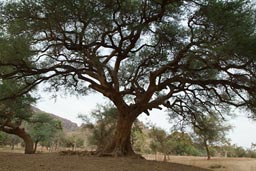
After centuries when slave traders and their African accomplices and Islamic jihadis chased the Dogon, this region has become Mali's most important tourist attraction. Dogon are distinctly friendly, to each other, their children and wives, which manifests itself through countless rituals, greetings, ceremonies, and something we would like to call women's rights.
They're hard working farmers, when the rains come in May all the now dusty plains become fields of millet, peanuts, beans, - and since recently rice. Onions, tomatoes, aubergines are cultivated all year round, irrigation permitting. The cliffs have many places where the water remains abundant even during the dry season. Most Dogon are self sufficient by definition.
Such is the complicated and enigmatic, to the Westerner so charming but only in bits graspable (hi)story of the Dogon.
Telly, Ende, Guiminie.
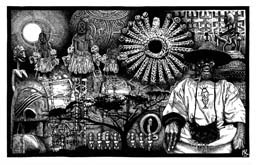
My guide Omar tells me. He is one of 4 advisers to the elders, also sits with them in the Togina, listens and writes down their stories. He is also a relais person, in the village of Guiminie, meaning the medical connection. Children seem all well up, non really sick, dust all over the faces, no mal-nutrition, get their vitamines regularly, just the runny noses of winter. In Sahel normally the saying is you need survive the first 3 years. In general Dogon for its value re tourisme is well taken care of dispensaries, maternities, schools.
Returning from the walk to Dourou I wait for the meal to ready, Omar prepares it himself, his wife is outside under the balanzan with the other women, grating millet, she had just given birth to their second child. There is an old Janome sewing machine, inherited from his father, Omar is a tailor.
While I write 30 or so children, keeping a respectful distance of 3 meters, play a game, sit all in a half circle, older girls count their feet, touching shin after shin, some rhyme. Now Omar comes chases them away. A sure sign dinner is ready.
Harmattan and the Dogon Cliffs.
No moon shine these nights, moon goes down when sun goes down. Freezing nights. No stars either due to Harmattan (wiki) and it seems it is here to stay. Roads are sandy, dunes, need deflate my tires. When I drive into Tirelli one tire goes. Also my little shitty air compressor breaks. I need to get out. But not yet. Also the skies break free. First blue in weeks.
Tirelli, Sanga.
Walk from Tirelli to Sanga, again we climb the plateau. My guide Amassamou walks ahead in huge steps over the black basalt. I follow. I like the walk. Some onion plantation. Sanga is not worth coming, a bus discharges of its load of American tourists, all well beyond 70, all in kaki, all the water bottle attached as told.
Children on school path up/down Dogon Escarpement.
Kids in primary schlool find a school near-by.
Second graders may have to make their way from one village to the other, this often means climbing the falaise - every day. Does keep them fit. Some however are not being sent to school like the girls of the Peul shepard in Tirelli. Peul often look after the cattle of the Dogon and settle in the dunes.
Irelli.
Koundou, 3 Yougas walk.
Early morning, bright, Harmattan is a forgotton plague. I team up with Rosalind, 66 for the walk to the 3 Yougas. Youga-Na, Youga-Dougourou and Youga-Piri. From Koundou we set out over open field, young baby baobabs greet, then a quick climb over cobble stones to Youga-Na. Too early for a drink. So further on to Youga-Dougourou and into the canyon which narrows more and more as we climb higher. With the help of Dogon ladders (cut of one trunk of a tree) we succeed climb out of the gorge onto the black moon like table top surface of the cliff. It is indeed the best I have done in Mali.
The devil has painted the plateau black, in summer it must be hot like hell. Boots would not be enough to prevent the heat from the rock burning through the soles. This comes to my mind. And I think of a beer which we find shortly after in Youga-Piri. Mali can not get much better.
The walk was it, to me this Dogon Land after 7 days cannot get any better. The worries about my tires are back. Next morning we take the road to Douentza, beautiful. Driving like on eggs. At 30k max. No air in the tires, as my compressor is out of order, really so are the tires.
28 Jan 2009 - Douentza, on the crossroads, Mali.
Again I have grease in my hair, what great mechanic I have become over the years, hate it. The same U-joint, gives more and more reason to worry. 2 tires repaired. They're getting old. How long can I wait till start replacing them. Will I make it to Ghana?
Pays Dogon wasn't clean clean. But countryside is always cleaner. Douentza, we are back where rubbish piles up in back streets. Douentza at the crossroads, Peul (cattle herders, so proud to have been the first to embrace Islam), Tamashek (Touareg/Tuareg, proud warriors and camelriders, from the Sahara), Dogon (so honest, hardworking, every yesterday white in Bamako still prefers a Dogon in the house) and Songhai (from the old empire that dominated the region around 1600), all are here, since 1985, since the great drought, since all the Peul cattle died, since the Dogon fields lay in dust. Douentza is a melting pot of many ethnic groups. Peul number the most, Dogon own more businesses.
It is 3 in afternoon, no need go to the internet, it doesn't work at this time, doesn't work much at any other time, mobile phones don't work at night. After the early afternoon work on the Land Rover I have a second Castel beer. Talibe kids glance in by the door, recite Allah, seeking alms, a meal, a dime, a banana. Talibe, disciples in Koranic school or just beggars depending how we look at it are a Malian/Senegalese Islamic phenomenon. And I cannot give to all, all the time. Evenings when I eat I buy two extra plates of beans that my street restaurant lady shares out between them. These youngsters never had a choice. Poor parents, many Peul, give their children away, to the Marabou, islamic religious leader. He however may already have a great many kids to take care of. 2 hours talib, education and 10 hours of alm seeking, those who survive are entitled to learn read and write.
When I came to Douentza I have dug out this Dogon intelligencia, suck out what he is prepared to tell me. He claims that in Burkina they have stopped this/disalowd it. Since Thomas Sankara (wiki), he says. Entering Burkina I would see as many Talibes as in Mali, maybe more. Sankara's times have long passed.
This great, magnetic African leader, in one line with Patrice Lumumba and Kwame Nkrumah, not undestood by the West, not given a chance, loved by the people, but out of his time, ground by world politics of the time, always wrong times anyway in Africa. Sankara was assassinated by his brothers in arms, on French behest. Thomas Sankara had only 4 years to make his half-revolutionary ideas work. Now his name is remembered as Che Sankara throughout Africa.
In Ouagadougou, capital of Burkina later I would walk Kwame Nkruma Avenue and large sized wall paintings in an outside cafe would figure them all, lined up, Lumumba, Nkrumah, Guevara the real one, King, X, Sankara would be missing, no wonder, but Obama woud be there instead.
Douentza on the crossroads, what raises the concern level really is the latest kidnapping of 4 tourists and their African driver near here, on road to Niger(news24). The Tuareg rebellion is closing in. This is still a bit away, but also not so far away. 400 ks? Soemthing moves from East to West over the savanna/desert. Sudan, then Chad, now Niger's and Mali's northern regions pretty much no go zones, but attacks/abductions spilled over into the central/southern parts recently. So-far we are still happily touring in Mali, but for how much longer. New travel warnings on Mauritania warrant a nocomment.
In Dogon land I picked up Rosalind, 66. 6 days ago. First gave her a lift, she walked on her own. Then we walked sections together, she has more power then I. Rosalind, English living in Scotland has travelled the world from Everest to Antarctica like not many. She's going east now.
In Douentza we eat well, and cheaper then in Dogon Land which charges touristy prices for touristy food, a nuisance, but what can you do. Douentza means street food, chicken in juicy sauce, fried chips and plantains, potatoes and ragout. And beans, 2 plates to the talibes. Bismillah.
Getting to Hombori and hand of Fatima.
The drive from Douentza to Hombori around the mountains to the north and then between Boni and the Hand of Fatima to the south of the main road is one of the most magnificent I have undertaken since in Africa. Like crowning the crowning. Amidst a half circle of red volcano structures that rise some hundreds of meters from the savanna plains. Monuments shaped by millions of years of winds and sand.
To me this is Mali and it cannot get any better. Such enthused I buy a few beers too many that night. From midnight on I suffer from one of the worst diarrhoeas ever. Food poisoning, the Senegalese, A Hombori street restaurant institution, the meat, left over liver from lunch, what ever. Or is it just a heat stroke. It is getting hot so very rapidly. Still early in year. Sun's banging down, no mercy from 8 a.m. onwards. We have moved north-east. Sahara is close.
After two days hanging in the robes, sleeping in the shade where I find it, this is my final good bye from Mali, la main Fatima, the setting moon, at Campo Espangnola. In total while on the Fab Trek, I have spent some 8 month here in Mali.
I leave Hombori next morning, crossing desolate border country, left to its own devices, no one cares about the people here but Allah maybe, out of reach of NGOs and governments. Left with the heat and dust, the brains burnt out these shepherds are left with medition and prayer. Still in Mali, exact border is unclear, I take two elders on board, they hitch a ride when I ask for the road, we follow the route of donkey cart trails through broken trees and scrub to Djibou. A foolish, funny lot. They seem to joke all the time. Funny Comics. No conversation is possible. They don't know how to unscrew a bolt when I need change a tire, that virtually exploded. Where from?
They're happy with the ride, I am with their guidance. In Djibou I get rid of them, otherwise I never find the customs here. Next morning after repairing 2 tires I ride to Ouaga.
Here I repair two more tires... 7 or 9 in 3 weeks since leaving Bamako... Now I definitely change them more often then my underwear.
Ouagadougou is lively, friendly. What will it bring to me? Fespaco will be on soon, the biannual African Film Festival, whose name and reputation has lured me for those past 3 years.
www.thisfabtrek.com > journey > africa > mali > 20090131-hombori

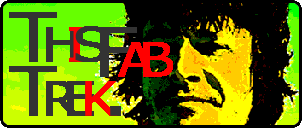


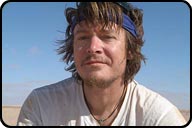
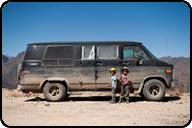
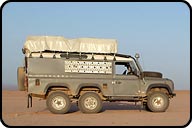

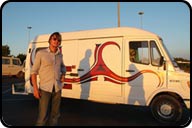
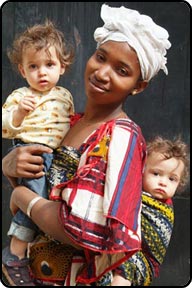
 contains Festival/Fiesta/Art photography.
contains Festival/Fiesta/Art photography.
